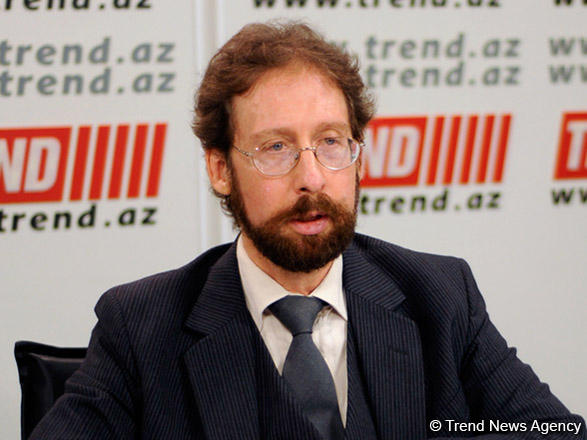Baku, Azerbaijan, May 2
By Aygun Badalova - Trend:
Oil prices will remain lower rather than higher amid the strong incentives for over-producing, Robert Cutler is a senior researcher at Carleton University and international energy consultant believes.
"Complete re-balancing of the world oil market by the end of this year is hard to foresee," Cutler told Trend.
"Prices may fluctuate and rise, as they have done even since Doha, but the incentives for over-producing are just too high," he said.
The US shale oil production will also play its role, expert believes.
"U.S. shale oil industry, which has replaced Saudi Arabia as the "swing" producer, continues to improve technologies and cost-effectiveness, such that more production can come on-line at lower world prices than was the case even a year ago," Cutler said.
"This will tend to keeps prices lower, rather than higher, even if movement towards re-balancing occurs," he added.
Oil prices softened Monday with global crude benchmark Brent and its U.S. counterpart West Texas Intermediate down on the back of bearish production data from OPEC, the Wall Street Journal reported.
Brent was down 1.25 percent at $46.78 for July cargoes while WTI dipped 0.89 percent on the New York Mercantile Exchange at $45.49 a barrel for June deliveries.
The OPEC data obtained by news agency Reuters suggest that April production from the producer group was up 170,000 barrels a day month-on-month at 32.64 million barrels per day.
The official quota for the OPEC oil output is 30 million barrels per day.
The last meeting of oil producers in Doha ended without reaching any agreement. The talks on oil output freeze collapsed after Saudi Arabia surprised the group by reasserting a demand that Iran also agrees to cap its oil production.
The next OPEC meeting, where the oil output freeze will be again discussed, is scheduled for June.
Cutler believes that an oil output freeze agreement is unlikely in the near future.
"Iranian oil and gas is under strong influence of the Revolutionary Guards, who essentially control the country's military-energy-industrial complex. They need revenue to maintain their political hegemony in the country, including for their foreign adventures, on which that domestic political dominance is partly based," Cutler said.
Consequently, it is unlikely that the Iranian state will join the agreement next time, as they declined to this also at Doha, explicitly invoking their dependence on energy industry for revenues, he added.
Spencer Welch, oil markets analyst, director of Downstream Consulting at IHS Energy, believes that a freeze will unlikely to happen before the market naturally comes back into supply and demand balance.
"Iran will still be trying to increase production and so won't agree to a freeze and so Saudi Arabia unlikely to take part in freeze and therefore freeze unlikely to happen," Welch told Trend.
According to the International Energy Agency's (IEA) expectations, the oil market to come back into balance from oversupply by next year.






